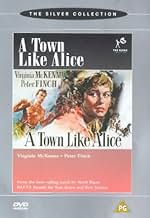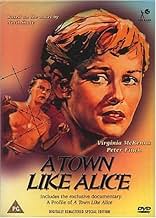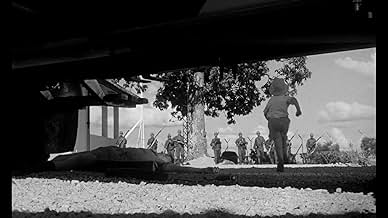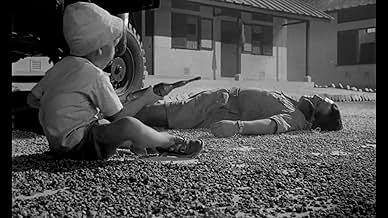NOTE IMDb
7,2/10
2,1 k
MA NOTE
Ajouter une intrigue dans votre langueA newly wealthy English woman returns to Malaya to build a well for the villagers who helped her during war. Thinking back, she recalls the Australian man who made a great sacrifice to aid h... Tout lireA newly wealthy English woman returns to Malaya to build a well for the villagers who helped her during war. Thinking back, she recalls the Australian man who made a great sacrifice to aid her and her fellow prisoners of war.A newly wealthy English woman returns to Malaya to build a well for the villagers who helped her during war. Thinking back, she recalls the Australian man who made a great sacrifice to aid her and her fellow prisoners of war.
- Réalisation
- Scénario
- Casting principal
- Victoire aux 2 BAFTA Awards
- 2 victoires et 5 nominations au total
Kenji Takaki
- Japanese Sergeant
- (as Takagi)
Munesato Yamada
- Captain Takata
- (as Yamada)
Otokichi Ikeda
- Kempetei Sergeant
- (as Ikeda)
Avis à la une
This film is in the same league as the series Tenko for it's realism. I have also watched the mini series which could have it's moments too but the film wins because of the fact that it was made around a decade after it had happened, when things must have been quite fresh in everyones minds. These women were taken captive as the men were but they were not wanted by anyone. These women were far away from home with no clothes apart from what they stood up in, no money and they didn't speak the language. Given those fact the thoughts are so scary!
I remember my mother and my aunt watching this film when I was a little boy late once night when it came on television.
They seemed to have cried most of the way through the film. This is an image that sticks in my mind whenever this film is mentioned.
Years later my mother told me how she lost some relatives in the second world war as they tried to escape from the Japanese in Burma by trying to walk it to India. They apparently died of exhaustion
A Town Like Alice adapted from the novel by Nevile Shute looks at a group of women as they shuffle from one Japanese camp to another during occupied Malaysia but no one would take them in. Slowly one by one they perish because of malnutrition, sickness, disease or exhaustion.
During their journey they are accompanied by an old guard who slowly comes to respect them.
During the journey Virginia McKenna meets Australian soldier Peter Finch also a prisoner of war but he does his best to help them out here and there and both fall for each other. However he faces severe punishment when he is found out for stealing some chickens.
The film is told in flashback as McKenna goes back to Malaysia after the war and discovers what happened to Finch.
This is a gritty and unromanticised view of life in occupied Far East, many years before films like Empire of the Sun. Also it is unusual for not being set in a prisoner of war camp, these people want to get there and stay there.
It was filmed in Malaysia and Australia for added authenticity.
Look out for Jean Anderson, many years later she appeared in the BBC television series Tenko which was also women held in a prisoner of war camp in Malaysia.
They seemed to have cried most of the way through the film. This is an image that sticks in my mind whenever this film is mentioned.
Years later my mother told me how she lost some relatives in the second world war as they tried to escape from the Japanese in Burma by trying to walk it to India. They apparently died of exhaustion
A Town Like Alice adapted from the novel by Nevile Shute looks at a group of women as they shuffle from one Japanese camp to another during occupied Malaysia but no one would take them in. Slowly one by one they perish because of malnutrition, sickness, disease or exhaustion.
During their journey they are accompanied by an old guard who slowly comes to respect them.
During the journey Virginia McKenna meets Australian soldier Peter Finch also a prisoner of war but he does his best to help them out here and there and both fall for each other. However he faces severe punishment when he is found out for stealing some chickens.
The film is told in flashback as McKenna goes back to Malaysia after the war and discovers what happened to Finch.
This is a gritty and unromanticised view of life in occupied Far East, many years before films like Empire of the Sun. Also it is unusual for not being set in a prisoner of war camp, these people want to get there and stay there.
It was filmed in Malaysia and Australia for added authenticity.
Look out for Jean Anderson, many years later she appeared in the BBC television series Tenko which was also women held in a prisoner of war camp in Malaysia.
I suppose that it should be confessed at the outset that I had the hots for Ms McEnna in her youth. Nevertheless, I still think that this is an excellent movie of the 1950's war genre.
Ginny and Peter Finch provide typically understated performances that are reminiscent of 'Ice Cold In Alex' and 'The Cruel Sea'. Solid, sterling, stiff-upper-lip-stuff that has no place in the spineless, simpering, metro-sexual third millennium.
I have never read Shute's novel, so I cannot comment on what liberties have been taken, but viewed without prejudice as a movie outlining Japanese brutality and human endurance it is still a well-realised piece of work. Everyone gives a thoroughly believable turn, both Caucasian and Oriental alike, as Ms McEnna's character concludes 'you can't really hate anyone' in the end. Though the Japanese - like their Nazi counterparts - did their very best to merit it.
Ms McKenna leads a group of unwanted western women and children, for whom no Japanese officer wants responsibility. So; they get shunted from one place to another, on foot, inadequately fed, and without medical assistance. Inevitably; they begin dying. Finch plays a captured Aussie running trucks for the Japanese. Filmed in black-&-white, in Britain and on location, it offers a very believable turn upon the miasmic swamps, crippling heat, humidity and deluging rain.
Of course, it's a love story too. And here again Ginny and Peter play their parts to perfection. I defy any true romantic not to be rendered lachrymose by her realisation of his survival and their final meeting at the end. Her hasty, last-minute application of cosmetics is particularly touching and well-observed. As if he'd care a hoot one way or the other.
It's a great old feel-good movie for the austerity generation. I give it nine stars and good luck to 'em all I say.
Ginny and Peter Finch provide typically understated performances that are reminiscent of 'Ice Cold In Alex' and 'The Cruel Sea'. Solid, sterling, stiff-upper-lip-stuff that has no place in the spineless, simpering, metro-sexual third millennium.
I have never read Shute's novel, so I cannot comment on what liberties have been taken, but viewed without prejudice as a movie outlining Japanese brutality and human endurance it is still a well-realised piece of work. Everyone gives a thoroughly believable turn, both Caucasian and Oriental alike, as Ms McEnna's character concludes 'you can't really hate anyone' in the end. Though the Japanese - like their Nazi counterparts - did their very best to merit it.
Ms McKenna leads a group of unwanted western women and children, for whom no Japanese officer wants responsibility. So; they get shunted from one place to another, on foot, inadequately fed, and without medical assistance. Inevitably; they begin dying. Finch plays a captured Aussie running trucks for the Japanese. Filmed in black-&-white, in Britain and on location, it offers a very believable turn upon the miasmic swamps, crippling heat, humidity and deluging rain.
Of course, it's a love story too. And here again Ginny and Peter play their parts to perfection. I defy any true romantic not to be rendered lachrymose by her realisation of his survival and their final meeting at the end. Her hasty, last-minute application of cosmetics is particularly touching and well-observed. As if he'd care a hoot one way or the other.
It's a great old feel-good movie for the austerity generation. I give it nine stars and good luck to 'em all I say.
The Rank Organisation went whole hog in producing A Town Like Alice with location shooting in Malaya, Australia, and the United Kingdom. The results were well worth the effort and the film was a big boost to the careers of Peter Finch and Virginia McKenna. In fact as Finch was becoming more and more an international star he would get fewer roles like this one, playing a native Australian.
I was expecting when deciding to view this film that it would be similar in nature to the American film Three Came Home that starred Claudette Colbert as a woman prisoner of the Japanese in World War II. The woman prisoners were segregated, but quickly housed and fended for themselves as best they could, but in a static setting.
When the male prisoners are separated from the females after the fall of Malaya, these woman are put under guard and just sent around like vagabonds with their children if they had them. Why they were selected for this rather special brand of torture we can speculate on end, but whatever the Japanese idea of chivalry was to the women, they couldn't just outright kill them. In fact none are during this film.
The film is seen through McKenna's eyes, she's working as a secretary in Kuala Lampur when the Japanese takeover. She takes over too as guardian of her boss's kids after their mother dies early on in the strange odyssey. Peter Finch plays an Australian soldier who with his mates they constantly run into and who offers them help when he can sneak food and medicine from the Japanese. He pays a heavy price for doing this when he's caught.
When he was killed by Irish Terrorists in 1979, it was learned that Lord Mountbatten had specifically requested that at his funeral no representation from the Japanese was to be permitted. As Supreme Commander of that theater Mountbatten remembered all the horror stories he heard from people survived Japanese internment, even the strange internment where apparently the whole country was their jail.
How McKenna and those that remained survived is quite a story, let's say it involved breaking a lot of cultural barriers to do it. One of the women who did it her own way was Maureen Swanson who after McKenna refuses his proposition, she takes up with a Japanese captain. Swanson is another you'll remember from A Town Like Alice.
Alice refers to Alice Springs in Northern Territory where Finch reminisces he'd like to return. It sounds like heaven, looks pretty good too after the years in Malaya. The film is a really good war film from the not often heard from point of view of woman prisoners.
I was expecting when deciding to view this film that it would be similar in nature to the American film Three Came Home that starred Claudette Colbert as a woman prisoner of the Japanese in World War II. The woman prisoners were segregated, but quickly housed and fended for themselves as best they could, but in a static setting.
When the male prisoners are separated from the females after the fall of Malaya, these woman are put under guard and just sent around like vagabonds with their children if they had them. Why they were selected for this rather special brand of torture we can speculate on end, but whatever the Japanese idea of chivalry was to the women, they couldn't just outright kill them. In fact none are during this film.
The film is seen through McKenna's eyes, she's working as a secretary in Kuala Lampur when the Japanese takeover. She takes over too as guardian of her boss's kids after their mother dies early on in the strange odyssey. Peter Finch plays an Australian soldier who with his mates they constantly run into and who offers them help when he can sneak food and medicine from the Japanese. He pays a heavy price for doing this when he's caught.
When he was killed by Irish Terrorists in 1979, it was learned that Lord Mountbatten had specifically requested that at his funeral no representation from the Japanese was to be permitted. As Supreme Commander of that theater Mountbatten remembered all the horror stories he heard from people survived Japanese internment, even the strange internment where apparently the whole country was their jail.
How McKenna and those that remained survived is quite a story, let's say it involved breaking a lot of cultural barriers to do it. One of the women who did it her own way was Maureen Swanson who after McKenna refuses his proposition, she takes up with a Japanese captain. Swanson is another you'll remember from A Town Like Alice.
Alice refers to Alice Springs in Northern Territory where Finch reminisces he'd like to return. It sounds like heaven, looks pretty good too after the years in Malaya. The film is a really good war film from the not often heard from point of view of woman prisoners.
I have the video of this movie which I got a few years back. I wish they would bring this movie out on DVD. Its wonderfully acted. Hard to believe this was based on a true story. I can't believe these women marched hundreds of miles, having nothing to eat much of the time and some of their companions dying along the way. They must have been a hardy bunch. Its too bad more people couldn't see this movie. Virginia McKenna and Peter Finch were excellent as the main characters and the rest of the supporting cast were very good too. I'm glad to have the video, but would very much like to see a DVD come out on it. The movie is in black and white but this in no way detracts from the story or the acting.
Le saviez-vous
- AnecdotesAccording to the book 'The Golden Gong---Fifty years of the Rank Organisation, its films and its stars' by Quentin Falk, "While at premiere of a Disney film, 'Robin Hood' [See: Robin des Bois et ses joyeux compagnons (1952)], he [Earl St. John] was particularly impressed by the young man who played the Sheriff of Nottingham. The name on the programme was that of Peter Finch. St. John bumped into Finch on the stairs of the theatre and invited him to come and talk business at Pinewood. Next day he gave Finch what would be a pivotal role in his burgeoning career: the Australian soldier, Joe, in Ma vie commence en Malaisie (1956).
- GaffesHarry Corbett bought his Sooty puppet from a regular store---he didn't design or create it as such. It's possible therefore that Freddie might have had the same puppet before Harry Corbett gave it national fame.
- Citations
[repeated line]
Japanese Sergeant: Japanese women walk!
- Crédits fousOPENING CREDITS PROLOGUE: "The characters in this story are fictitious. The story itself however is based upon true fact."
- ConnexionsFeatured in A Profile of 'A Town Like Alice' (2001)
Meilleurs choix
Connectez-vous pour évaluer et suivre la liste de favoris afin de recevoir des recommandations personnalisées
- How long is A Town Like Alice?Alimenté par Alexa
Détails
- Date de sortie
- Pays d’origine
- Langues
- Aussi connu sous le nom de
- The Rape of Malaya
- Lieux de tournage
- Kuala Lumpur, Malaisie(establishing shot of British Government Offices - now the Sultan Abdul Samad Building)
- Sociétés de production
- Voir plus de crédits d'entreprise sur IMDbPro
- Durée
- 1h 57min(117 min)
- Couleur
- Rapport de forme
- 1.66 : 1
Contribuer à cette page
Suggérer une modification ou ajouter du contenu manquant































